The Annastacia Palaszczuk gamble that almost sank Brisbane 2032 Games bid
Just how Brisbane won has been far rockier than the slideshows to IOC members. Several hiccups almost derailed the bid, the most significant only three months ago.
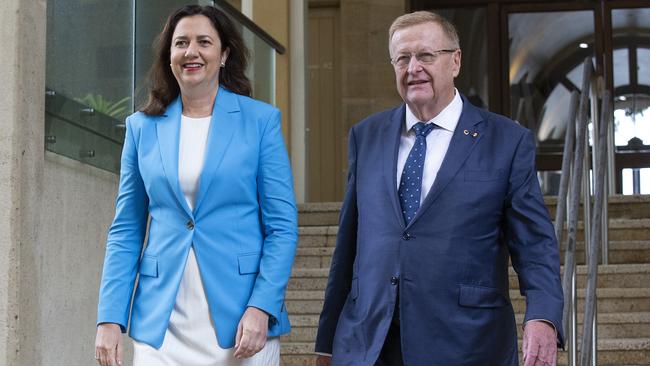
Annastacia Palaszczuk hasn’t stopped beaming in Tokyo. Brisbane and Queensland will be the Olympic Games hosts in 2032 after the International Olympic Committee was wooed by Australia’s political unity, financial securities, sunny skies and love of sport.
But what the IOC and perhaps even the Queensland Premier herself didn’t realise during Wednesday’s vote in Japan was that the bid was very nearly scuppered three months ago after Canberra was blindsided – and angry – at $1bn worth of political posturing.
Just how Brisbane won the Olympic Games has been far rockier than the smooth presentation to IOC members.
In an investigation uncovering the bid’s development, The Australian can reveal there were key moments when the bid was almost derailed and there was even a hiccup in the final week. The most significant moment happened only three months ago, on April 19.
On that day, Palaszczuk was in Brisbane unveiling $1bn plans for the Gabba to be the “crowning glory’’ of a local Olympic Games, increasing seating by 8000 to 50,000 spectators at the cricket ground to be redeveloped for the Brisbane 2032 opening and closing ceremonies and athletics.
But politicians in Canberra were shocked when she insisted that “to take it to that level will need the continued support of the commonwealth”.
Not only was the big announcement at odds with the fiscally-restrained Olympic pitch under the IOC’s cost-cutting demands, Palaszczuk hadn’t discussed it with the federal government – which at that point was in final negotiations for a 50-50 Olympic funding split of an $11bn deal over 11 years.
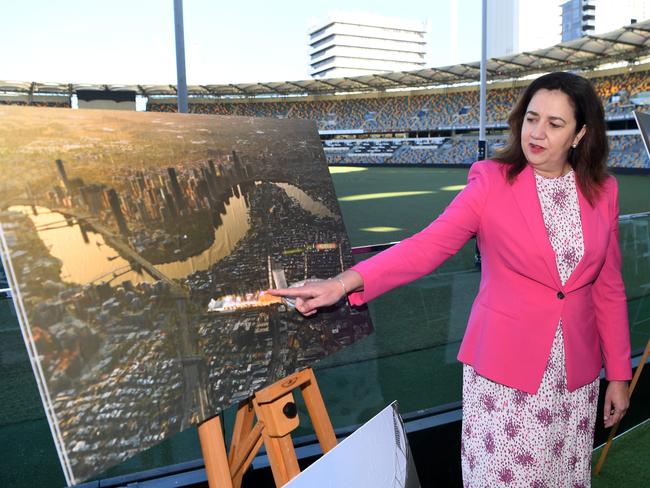
The deadline for the IOC guarantee was less than a week away. Going directly to the media to bounce the federal government into a hugely expensive landmark project was a high-risk ploy.
“She doesn’t know how close she came to killing the whole thing,’’ said one Canberra source. Bureaucrats are still incandescent about it. Everyone did the maths and worked out that Palaszczuk wanted to spend $125,000 for each extra seat.
Said Liberal MP Ted O’Brien, Scott Morrison’s representative on the Olympic Candidature Leadership Group, whose career has been spent negotiating billion-dollar deals: “You don’t publicly announce a $1bn project without consulting the other parties. Far worse than an act of ill-discipline, it demonstrated poor judgment and risked a fight breaking out that may have killed the deal.’’
Palaszczuk quickly came to understand the impact of her stunning announcement because it provoked several days of an extraordinary state-federal stand off as to who would pick up the phone and call whom.
The bid was, according to veteran Australian Olympic Committee president and IOC vice-president John Coates, “very precarious’’. He added: “I thought she might have blown it.’’
Over that weekend, worried bureaucrats tried to work out how to break the communications impasse. On the Monday morning, Morrison’s dark mood changed and he got the bid back on track, demanding a true 50-50 split, not just of the future Olympic infrastructure money, but on the governance of the spending as well under an Olympic Infrastructure Board and of the Brisbane Games organising committee.
Eleventh-hour bid
The paperwork got to the IOC within the final hour of the Monday evening deadline.
It wasn’t the first time that an enthusiastic Morrison, whose career was deep in tourism at the time of the Sydney 2000 Olympics, had reignited the bid momentum: he had met IOC president Thomas Bach on the sidelines of both the G20 meetings in Osaka, Japan, in 2019 and was immediately on the front foot, saying, “We want to do this” and offering up $10m for campaigning.
Bach told him: “Save your money.” Under new processes, there is no open competition: bids considered a possibility are instead invited to liaise with the IOC.
Morrison quipped to Bach that such savings would then “get John Coates and Alan Jones off my back for more money”, causing confusion as the Olympics chief didn’t know who the Sydney-based radio commentator was.
But the Prime Minister’s enthusiasm for the Games touched all the right notes with Bach. Then in November the same year, Morrison was once again in Japan, meeting new Prime Minister Yoshihide Suga – a visit that coincided with a meeting of the Tokyo 2020 Olympic co-ordination commission, chaired by Coates.
Morrison invited both Coates and Bach to his room at the Imperial Hotel.
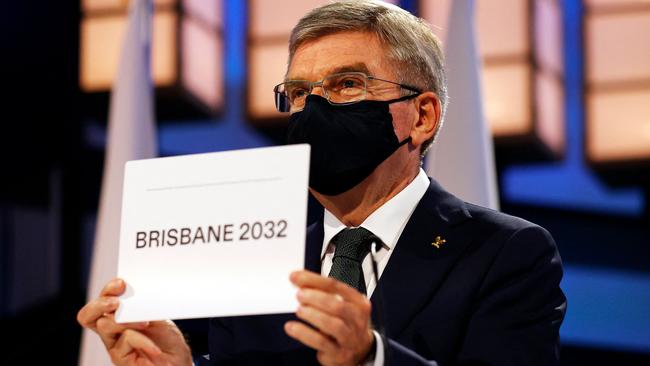
So in Canberra this April, Morrison’s ultimatum was explicitly clear to Palaszczuk. This won’t be the federal government handing a blank cheque to Queensland to fastback builds of road and rail connections between the Sunshine and Gold Coasts, but an unprecedented joint state-federal decision-making in the planning, the scoping and the building, as well as the organising of the Brisbane Games.
Palaszczuk’s office said the Premier had been pushing for this cost-share for weeks, if not the power-share. In Brisbane, there was frustration that Canberra was pushing the decision to the very end.
By that afternoon on Monday April 26, the Prime Minister then rang Coates to tell him the news that Canberra was putting in its money and guaranteeing the finances. Coates was at that time in the Sydney offices of law firm Jones Day, formulating a plan for how an organising committee might be put together.
“I was very relieved, and I was also very pleased,” said Coates, who then received a call from Josh Frydenberg to confirm the same information. “I texted the Premier and she grasped it, she got it and texted me ‘We got there’ and I texted her ‘Congratulations’,” he said. “She has embraced it – she did so at once, and she has done so ever since.”
Palaszczuk had pushed her luck, but her political cunning paid rich dividends. “I always say we work best when we work together. This proves it,” she said.
And so to the relief of those who had worked relentlessly behind the scenes, the financial guarantees to the IOC went in just hours before the April 27 deadline, which ensured enough time for the executive board to sign off on the vote being put on the Tokyo session agenda and to organise a June 24 private technical briefing online for IOC members.
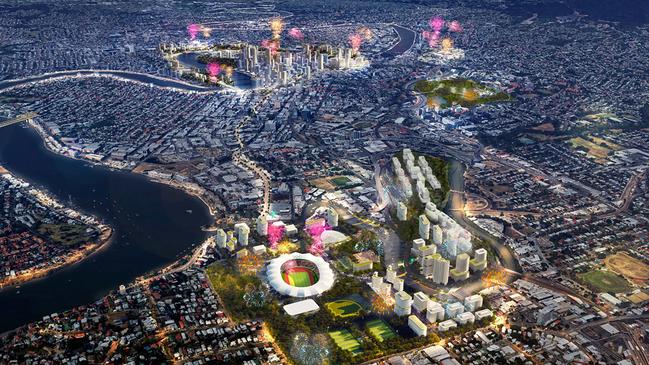
Pushback
Over the past few months, O’Brien has deliberately pushed back on Queensland’s wishlist of joint infrastructure deals until the Olympic Games decision was over the line. He has kept stressing the need for outward-looking unity.
“As far as I was concerned, we could either blow the deal up with a big fight over future road and rail projects, or postpone those arguments until after we secure the Games,’’ O’Brien said.
“The IOC accepted that our final submission would exclude commitments to specific unfunded future transport projects.”
If not, those talks between state and federal governments may have taken years.
Brisbane’s decision to strive for the 2032 Olympic Games had only gathered pace during a balmy May 2019 evening when Palaszczuk and Bach bonded over a menu of Darling Downs Wagyu beef, Patagonia tooth fish with sauce vierge and wines of the ilk of Tolpuddle chardonnay and Diane Madelaine cabernet.
On the top floor of the Darling Hotel on the Gold Coast, the chairman of Star Casino John O’Neill hosted this high-powered gathering at the Nineteen at The Star restaurant, which was very much designed to get the Queensland government involved and put a then reluctant Palaszczuk and Bach in the same room.
Coates, who doubles as Bach’s right-hand man in the Olympic world, was at his zenith of making the connections.
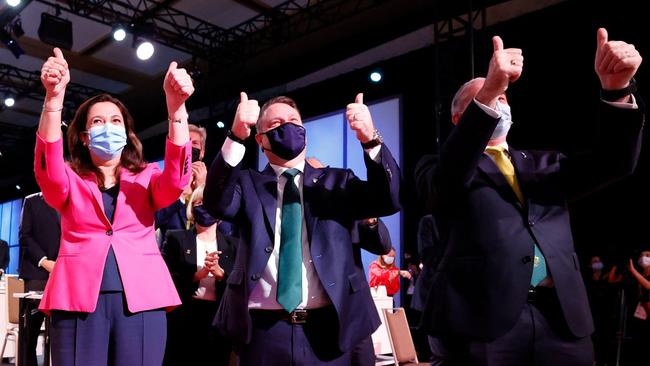
Coates had been introduced to Palaszczuk before she became Premier during Derby Day at the Melbourne Spring racing carnival, through a joint friendship with Labor powerbroker Graham Richardson. Coates was on a mission to bend her ear. But at the time, then Queensland deputy premier Jackie Trad was vehemently opposed to the 2032 Olympics.
Palaszczuk was also consumed by the approvals process for the Adani coalmine and had initially appeared disinterested.
But Bach was in town for the gathering of global sports business Sport Accord, and he had long been a fan of Australia hosting another Olympic Games.
The German sports leader even keeps in touch with his Katoomba-based volunteer driver from the Sydney 2000 Olympics.
Six years ago in February 2015, Bach told this writer during an interview at the IOC headquarters at the Chateau de Vidy in Lausanne, Switzerland, that Australia should consider another Olympic bid because “Australians love their athletes and the Olympic candidature is a great boost to the athletes for their support”.
Bach joked back then that the problem for Australia would be not whether to bid, but deciding which city would be best placed to put up their hand.
But as Bach could have predicted, Coates would have to delicately decline tentative interest from Melbourne and Sydney (and there were murmurings from both) because only Queensland’s northern weather was suitable to host the Games in the vital pre-NBL window best suited to the big US broadcaster NBC.
NBC is the Olympics’ biggest income source: it has paid more than $US7bn in Games broadcasting rights up to and including Brisbane 2032.
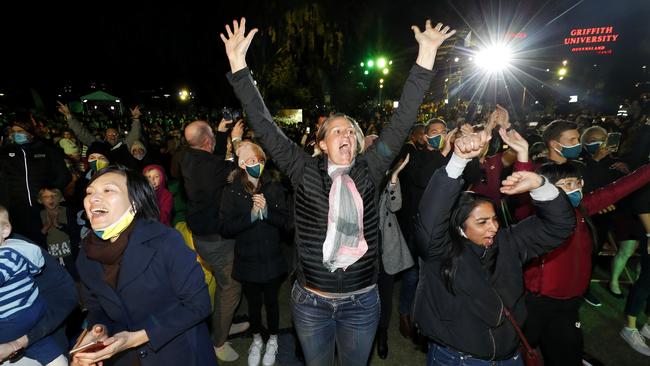
Seed of an idea
Another journalist at The Australian, Wayne Smith, followed up on Bach’s comments, encouraging the mayors of southeast Queensland to fund a feasibility study looking at the advantages of hosting the Olympic Games.
Graham Quirk, the then lord mayor of Brisbane, didn’t need much encouragement after Wayne Smith’s phone call: he had been on the council back when Coates worked for Sally Ann Atkinson lobbying for a Brisbane Olympic bid back in 1985 and 1986.
A seed of an idea was sown.
The Council of Mayors South East Queensland moved swiftly, organising a pre-feasibility study in July 2016 followed by a comprehensive feasibility study in February 2019, showing big Olympic Games benefits to Queensland, particularly fast-tracking much-needed infrastructure development between the Sunshine Coast and the Gold Coast, the fastest-growing region in Australia.
So by early 2019, when the groundwork had been done, Coates lent on O’Neill – a friend of more than 50 years going back to their law study days at Sydney University – to host that restaurant soiree overlooking the sparkling lights of the Gold Coast. This was the time to get the Queensland government on board. He felt that Queensland needed some big-picture prodding.
Said O’Neill of that evening: “It was a crucial icebreaker because all the important players were in the one room to move the concept into a reality … because a lot of these things are often about personalities and how they get on.’’
As the wine flowed and the 9.45pm carriages were delayed until closer to midnight, the evening was deemed to have been a rousing success – especially at the farewells when Bach shook Palaszczuk’s hand and formally invited the Premier to the newly finished $230m Olympic headquarters building in Lausanne to continue the discussions.
One of the guests remarked: “Thomas Bach can be a real flatterer when he wants to be.’’
Four months later, while Queensland was battling bushfires, Palaszczuk, O’Brien, O’Neill and others were inside Olympic House on the shores of Lake Geneva listening to a series of IOC staff presentations detailing the processes of an Olympic bid under new cost-cutting requirements.
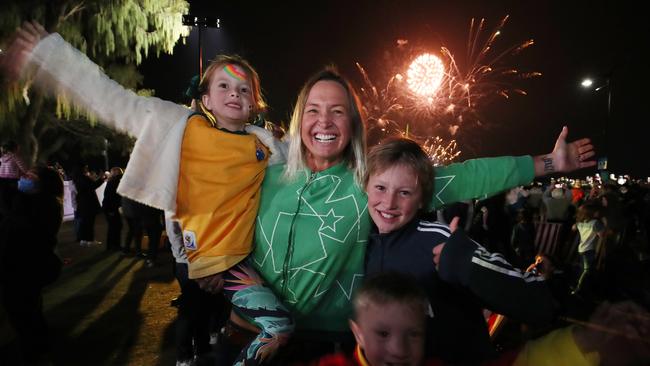
At the lunch break, when Bach joined the gathering, Palaszczuk went into a final huddle to prepare for “showtime”.
For the next few hours, the Premier impressively delivered a sincere pledge that Queensland would not let down the Olympic movement.
Stressing Australia’s support from all levels of government, her frankness connected with Bach’s no-nonsense approach.
When the meeting broke up and everyone spilled outside into the courtyard for afternoon tea, there were smiles all round. Queensland had impressed Lausanne as much as Lausanne had impressed Queensland. Canberra was on board, as were the mayors.
Palaszczuk was forced to cut short the trip – which was to also meet Paris 2024 organisers – to deal with Queensland’s bushfires. And Coates got to work.
The importance of Coates to the Brisbane bid is incalculable. A former coxswain and lawyer, he has headed the Australian Olympic Committee for 31 years – crucially delivering the 2000 Sydney Olympics with an eve-of-vote delivery of development fund money to African nations.
Coates, 71, has been close to Bach since his presidential election in 2014 and even drafted the new Olympic bid rules whereby the IOC engages in talks with prospective hosts rather than having an expensive lobbying contest between cities.
He has had to excuse himself from various IOC meetings to avoid a conflict of interest, but Coates’s innate understanding of what was required helped move the Brisbane bid along.
Importantly last year, at a time when the Olympic Candidature Leadership Group was on pause for the Queensland state elections and the coronavirus restrictions, Coates kept the process going to finalise details of the masterplan and ensure the 32 different Olympic international sports federations were comfortable with the Brisbane plans.
Come this week, it was a foregone conclusion that the IOC members would approve the candidature, although suggestions that Palaszczuk may cancel her trip to Tokyo caused a late flutter.
Opposition nations – including Qatar, Germany, Indonesia and South Korea – sensed they could force a delay in the vote.
If Palaszczuk had excused herself to attend to a Covid “crisis” when the countries of most IOC members have been battling hundreds or thousands of daily deaths, it would not have gone down well. But in the end she arrived, reassuring the members of the state’s commitments and won the vote.
No one was more pleased than Coates. “I look forward to the next generation of Keirens (Perkins) and Cathys (Freeman) that come out of this,’’ he said.


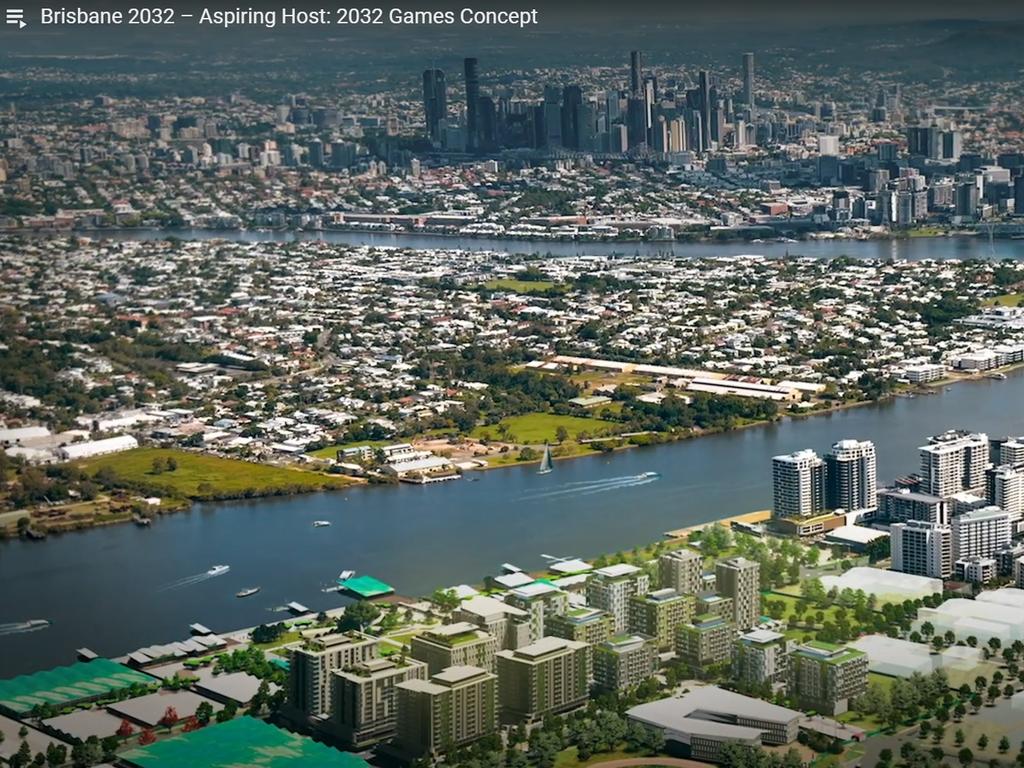
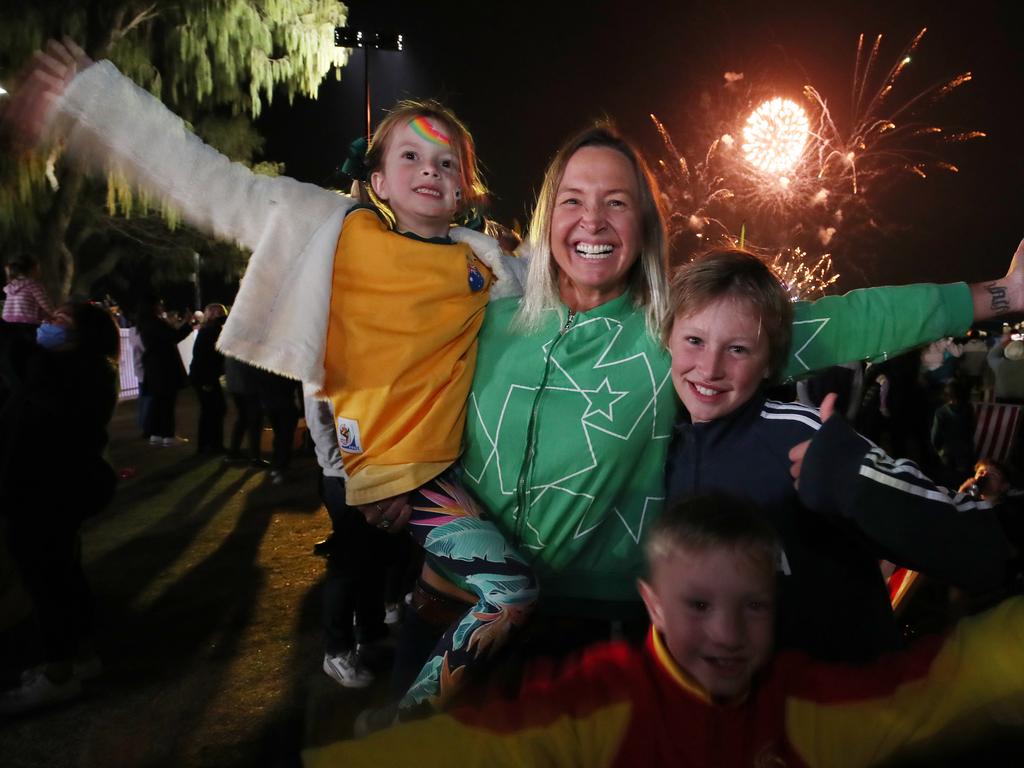
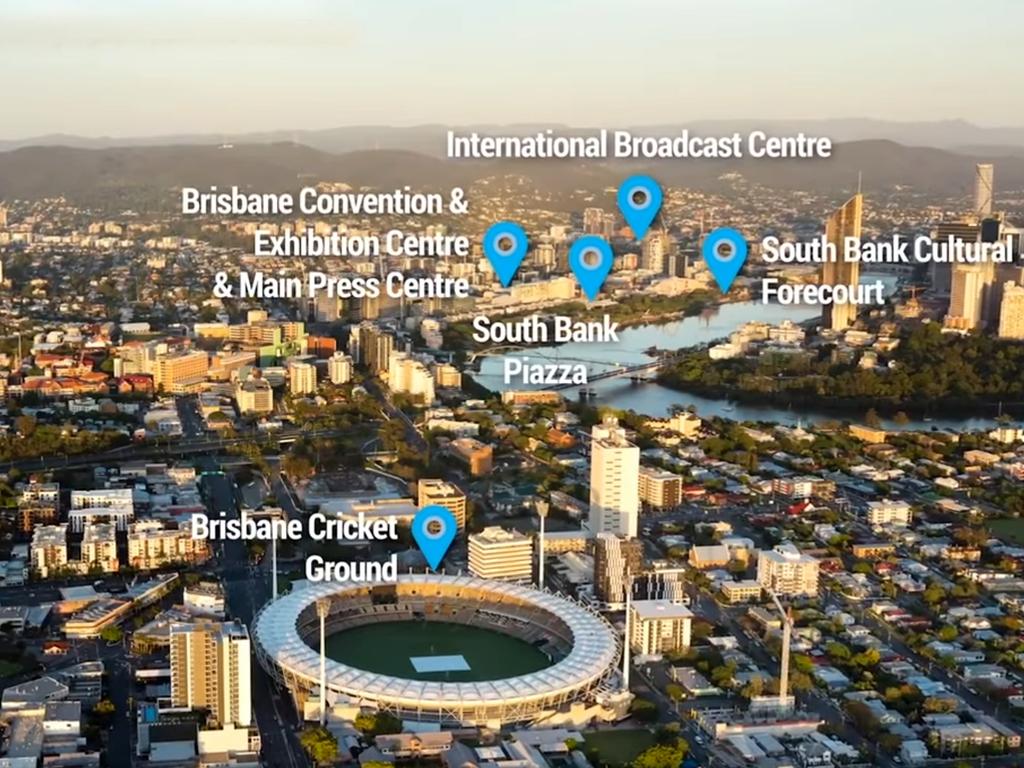



To join the conversation, please log in. Don't have an account? Register
Join the conversation, you are commenting as Logout